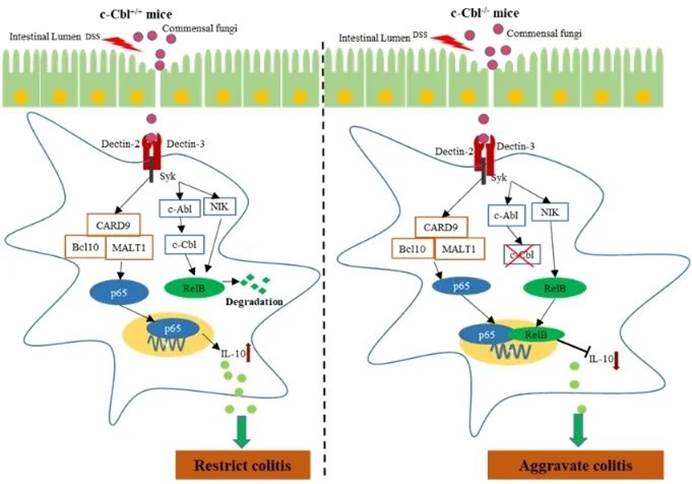On May 7, Professor JIA Xinming’s research group from Tongji University School of Medicine published a research paper entitled "E3 ligase c-Cbl regulates intestinal inflammation through suppressing fungi-induced noncanonical NF-κB activation" in Science Advances.

C-Cbl negatively regulates non classical NF- κ B activation to limit the occurrence of enteritis
Intestinal fungi are critical for modulating host immune homeostasis and underlying mechanisms remain unclear. The study shows that dendritic cell (DC)–specific deficiency of casitas B-lineage lymphoma (c-Cbl) renders mice susceptible to dextran sodium sulfate (DSS)–induced colitis. Mechanistically, the team identifies that c-Cbl functions downstream of Dectin-2 and Dectin-3 to mediate the ubiquitination and degradation of noncanonical nuclear factor κB subunit RelB. Thus, c-Cbl deficiency in DCs promotes α-mannan–induced activation of RelB, which suppresses p65-mediated transcription of an anti-inflammatory cytokine gene, il10, thereby aggravating DSS-induced colitis. Moreover, suppressing fungal growth with fluconazole or inhibition of RelB activation in vivo attenuates colitis in mice with DC-specific deletion of c-Cbl. The study also demonstrates an interaction between c-Cbl and c-Abl tyrosine kinase and find that treatment with DPH, a c-Abl agonist, synergistically increases fungi-induced c-Cbl activation to restrict colitis. Together, these findings unravel a previously unidentified fungi-induced c-Cbl/RelB axis that sustains intestinal homeostasis and protects against intestinal inflammation.
DUAN Jielin, doctoral student of Tongji University School of Medicine, is the first author of this paper. Professor JIA Xinming is the corresponding author of this paper.
